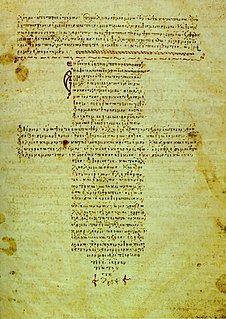Michael C. Dorf is an American law professor and a scholar of U.S. constitutional law. He is currently a Professor of Law at Cornell Law School. In addition to constitutional law, Professor Dorf has taught courses in civil procedure and federal courts. He has written or edited three books, including No Litmus Test: Law Versus Politics in the Twenty-First Century, and Constitutional Law Stories, as well as scores of law review articles about American constitutional law. He is also a columnist for Findlaw.com and a regular contributor to The American Prospect. Dorf is a former law clerk to Justice Anthony Kennedy of the U.S. Supreme Court and Judge Stephen Reinhardt of the United States Court of Appeals for the Ninth Circuit.
Kenji Yoshino is a legal scholar and the Chief Justice Earl Warren Professor of Constitutional Law at New York University School of Law. Formerly, he was the Guido Calabresi Professor of Law at Yale Law School. His work involves Constitutional law, anti-discrimination law, civil and human rights, as well as law and literature, and Japanese law and society. He is actively involved with several social and legal issues and is also an author.

Joseph Grundfest is an American academic. He is the William A. Franke Professor of Law and Business at Stanford Law School and co-director of the Rock Center on Corporate Governance at Stanford University. He joined Stanford's faculty in 1990 after having served for more than four years as a Commissioner of the United States Securities and Exchange Commission, a position to which he was appointed by President Ronald Reagan.
Bernard Bell is the Associate Dean for Academic Affairs and Faculty Professor of Law and Herbert Hannoch Scholar at Rutgers School of Law–Newark.
Robert I. Weisberg is an American lawyer. He is an Edwin E. Huddleson, Jr. Professor of Law at Stanford Law School, and an expert on criminal law and criminal procedure, as well as a leading scholar in the law and literature movement.
Howard Fenghau Chang is an American legal academic and the Earle Hepburn Professor of Law at the University of Pennsylvania Law School.
Tobias Barrington Wolff is a professor of law at the University of Pennsylvania Law School where he teaches classes on sexuality and the law, same sex marriage and human rights. He is well known for his legal advocacy on same sex marriage and other LGBT-related issues, and has served as the chief advisor and spokesperson on LGBT issues for Barack Obama throughout his 2007-08 presidential campaign. He is openly gay.

Joseph Dinneen Kearney is Dean and Professor of Law at Marquette University Law School in Milwaukee, Wisconsin. A former clerk for Supreme Court Justice Scalia, he is a scholar of civil litigation practice and procedure.
James Joseph "Jim" Tomkovicz is a professor of law at the University of Iowa College of Law. Tomkovicz has authored six amicus curiae briefs in the Supreme Court of the United States; most recently, he was on the winning side of a 5-4 decision in Arizona v. Gant.
Roger Kirst is the Henry M. Grether Professor of Law at the University of Nebraska–Lincoln College of Law. He has been a faculty member at the law school since 1974.
Barbara Allen Babcock is the Judge John Crown Professor of Law, Emerita at Stanford Law School. She is an expert in criminal and civil procedure and has been a member of the Stanford Law School faculty since 1972.

Larry Kramer is an American legal scholar and nonprofit executive. He is the current president of the William and Flora Hewlett Foundation and the former dean of Stanford Law School (2004–2012). He is a scholar of both constitutional law and civil procedure.
Christopher Alan Bracey is an American law professor and former litigator. In 2017, he serves as a law professor at the George Washington University Law School and Vice Provost for Faculty Affairs at the George Washington University. He is a leading scholar on race, inequality, and the law. He is the author of Saviors or Sellouts: The Promise and Peril of Black Conservatism from Booker T. Washington to Condoleezza Rice (2008) and co-editor of The Dred Scott Case: Historical and Contemporary Perspectives on Race and Law (2010). Since 2011, he has served as the Senior Associate Dean for Academic Affairs at the George Washington University Law School.
Nathaniel Persily is the James B. McClatchy Professor of Law at Stanford Law School, where he has taught since 2013, and is a nationally recognized scholar of constitutional law, election law, and the democratic process.
C. Scott Hemphill is a legal academic whose scholarship focuses on intellectual property law and antitrust law. He is currently a Professor of Law at New York University Law School, where he has taught since 2015. Previously, Hemphill was a Professor of Law at Columbia Law School.
Bernadette Meyler is the Carl and Sheila Spaeth Professor of Law at Stanford Law School, where she has taught since 2013. Meyler's scholarship focuses on British and American constitutional law, the history of the common law, and the intersection of law and the humanities.
Gillian K. Hadfield is the Richard L. and Antoinette Schamoi Kirtland Professor of Law and Professor of Economics at the University of Southern California. At USC, Hadfield previously directed the Southern California Innovation Project and the USC Center in Law, Economics, and Organization. She is also the former director of the American Law and Economics Association and the International Society for New Institutional Economics.
Thomas C. Grey is the Nelson Bowman Sweitzer and Marie B. Sweitzer Professor of Law, Emeritus, at Stanford Law School. As a legal theorist and a historian of modern American legal thought, Grey has written widely on pragmatism, legal formalism, legal realism, and the jurisprudence of Oliver Wendell Holmes, Jr.
Alan Mitchell Polinsky is the Josephine Scott Crocker Professor of Law and Economics at Stanford Law School. At Stanford, Polinsky is the founder and director of the John M. Olin Program in Law and Economics. He is also a past president of the American Law and Economics Association.






